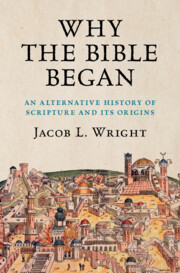Book contents
- Why the Bible Began
- Why the Bible Began
- Copyright page
- Dedication
- Contents
- Figures
- Maps
- Acknowledgments
- Prologue
- Introduction
- Part I The Rise and Fall
- Part II Admitting Defeat
- Part III A New Narrative
- Part IV A People of Protest
- 22 The Matriarch
- 23 The Hero
- 24 The Other
- 25 The Soldier
- 26 The Prophet and the Priest
- 27 The Sage
- 28 The Poet
- 29 The Queen
- 30 Conclusions
- Subject Index
- Scholars Cited
- Biblical References
- References
30 - Conclusions
Nations, Nationalism, and New Bibles
from Part IV - A People of Protest
Published online by Cambridge University Press: 13 July 2023
- Why the Bible Began
- Why the Bible Began
- Copyright page
- Dedication
- Contents
- Figures
- Maps
- Acknowledgments
- Prologue
- Introduction
- Part I The Rise and Fall
- Part II Admitting Defeat
- Part III A New Narrative
- Part IV A People of Protest
- 22 The Matriarch
- 23 The Hero
- 24 The Other
- 25 The Soldier
- 26 The Prophet and the Priest
- 27 The Sage
- 28 The Poet
- 29 The Queen
- 30 Conclusions
- Subject Index
- Scholars Cited
- Biblical References
- References
Summary
Speaking at a European academic conference, the American biblical scholar Bernard Levinson pointed out that cuneiform literature from ancient West Asia contains, in isolation, “almost all the individual phenomena that we associate with the Bible,” including textual stabilization, a textual curriculum, memorization and study of texts, and texts acting as forms of acculturation. The literary genres are also for the most part the same, with their legal collections, theophany texts, prophetic utterances, rituals, omens, laments, hymns, prayers, and proverb collections. Moreover, our analyses of these texts reveal similar scribal techniques, such as superscriptions, acrostics, annotation, and colophons. Yet there is, according to Levinson, a crucial difference between biblical and cuneiform literature.
- Type
- Chapter
- Information
- Why the Bible BeganAn Alternative History of Scripture and its Origins, pp. 464 - 472Publisher: Cambridge University PressPrint publication year: 2023



